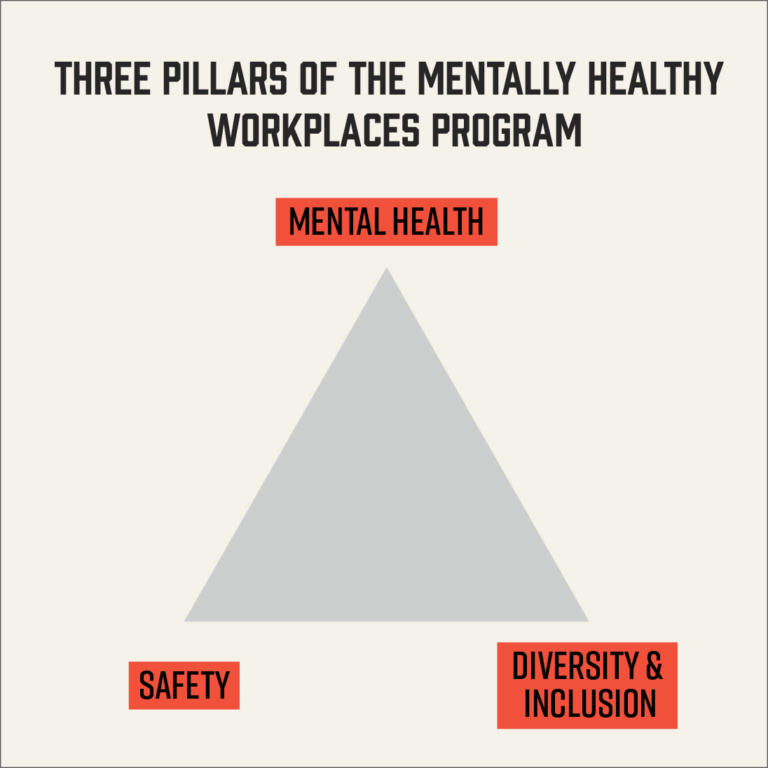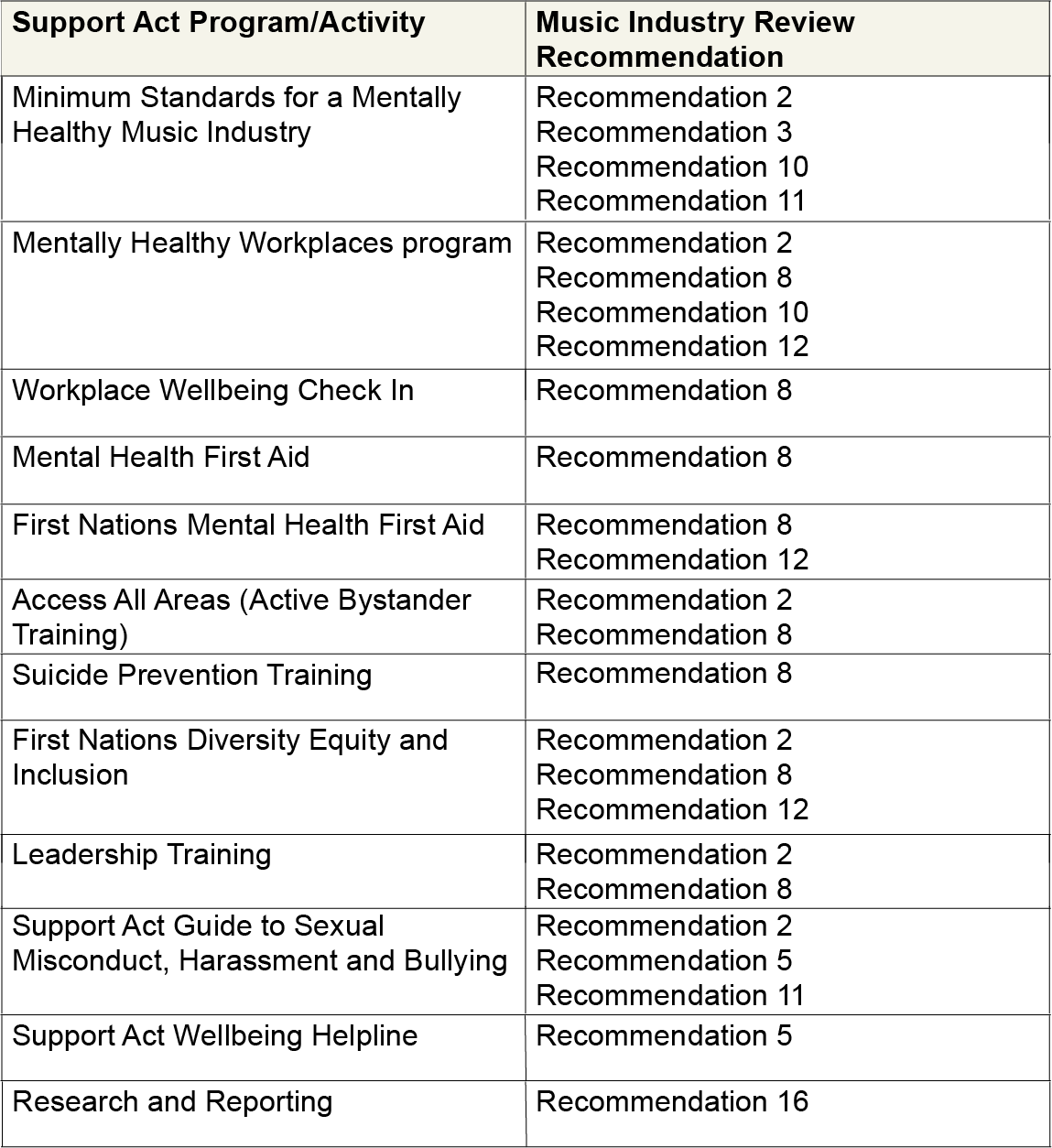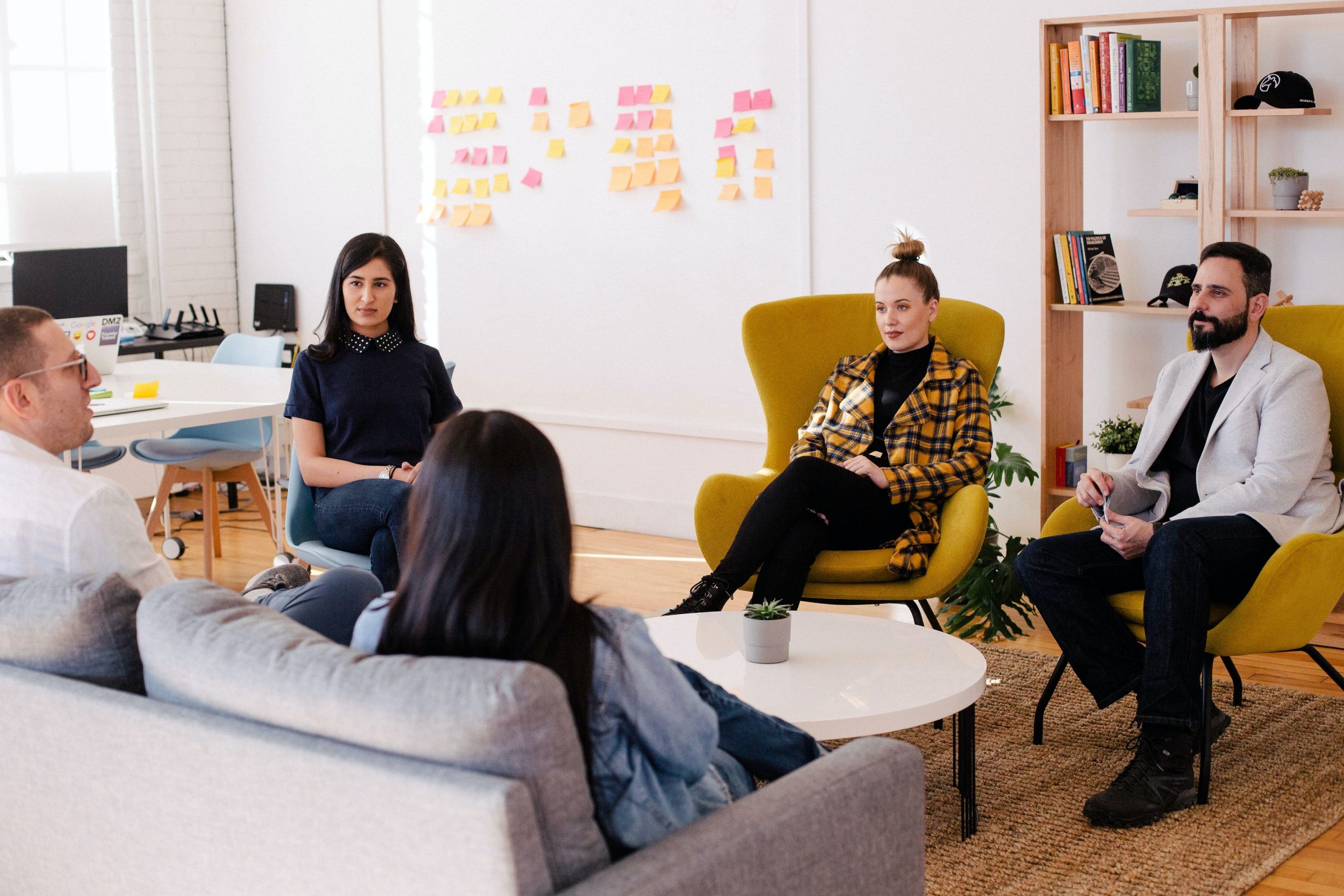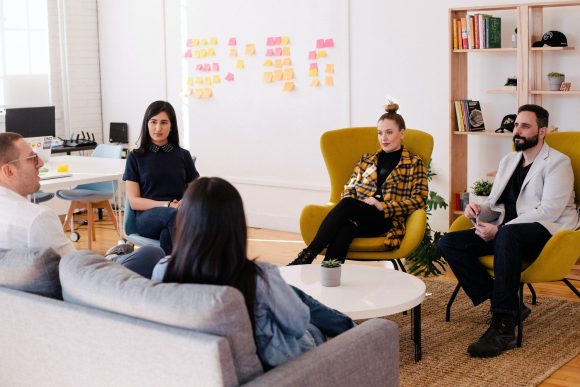Choose an Option
We understand that workplaces across all genres of music can look a little different to your regular 9-5 office gigs. Music workers lug, mix, produce and perform out of diverse work environments (including music studios, green rooms, tour buses, concert stages and large arenas) with a unique range of on-the-job pressures and expectations that can impact psychological safety, and increase the risk of psychosocial hazards.
Support Act is happy to offer a number of industry-specific workshops and culturally intelligent training sessions designed to promote mental health awareness, psychological safety and positive cultural change with the goal of creating a safe and thriving music industry for all.
In line with our First Nations Strategic Plan, our programs also deliver culturally intelligent, respectful and trustworthy support to all First Nations peoples accessing it.
The importance of cultivating and sustaining mentally healthy workplaces goes beyond the warm and fuzzies. Under the Respect@Work legislation, all workplaces – from garage studio set-ups to national organisations – have a “positive duty” to ensure a healthy workplace culture. That doesn’t simply mean a workplace that is free from harassment, discrimination and bullying. It also means that anyone running a business must proactively consider how job roles, working environments and workplace relationships can be best managed to prioritise mental health and wellbeing while on the job.

Our offerings are available to any music-based business operating in Australia and are mostly free of charge to small and medium sized orgs, thanks to the support of our donors and sponsors. Dedicated services for larger organisations are by negotiation.
Where to start
We recommend your business, or workplace starts with these introductory workshops:
REWIRE: Managing Mental Health (for music and creative industry workers andor managers/team leaders); Access All Areas; and Voices Amplified.
These workshops guide participants through the basics of mental health awareness, psychosocial safety at work, and diversity, equity and inclusion. This is the perfect starting point for any business wanting to ensure staff and management understand the basics when it comes to:
- Mental Health Support & Wellbeing for Individual Music and Creative Industry Workers
- Psychosocial Safety & Potential Hazards for Music and Creative Industry Workplaces
- Recognising & Intervening in instances of Workplace Bullying, Harassment & Discrimination within Music Workplaces
- The Diverse Needs & History of First Nations Music Workers
Depending on the size of your organisation, these workshops can be delivered exclusively for your team. Alternatively, we have public-access sessions running throughout the year, where people across organisations can tune in online and take part.
REWIRE: Managing Mental Health
Sessions tailored to staff or managers, exploring why working in music and the creative industries can be hard on mental health, how self-care can help, and how to give and get support.
Access All Areas
A program designed to educate members of the music workforce on how to actively intervene when witnessing sexual harassment, assault and bullying.
Voices Amplified
Go deeper
If team leaders or staff members are keen to supercharge skills in the realms of mental health support, we offer Mental Health First Aid, which can be scheduled on request (or attended via public access sessions).
Mental Health First Aid
Start now
We also offer online, self-paced workshops that you and your staff can dive into, anytime anywhere.
Money Moves
An online, self-paced workshop that runs through the basics of money management and financial wellbeing for music workers. Topics include savings, budgeting, super and tax.
Suicide Prevention Training
An online, self-paced training to teach you how to recognise when someone is having thoughts of suicide, how to respond, and how to connect them to help and support.
Short and sweet
We know it can be tough squeezing in wellbeing workshops to your busy days, so we’ve introduced the Minis, a suite of 1-hour workshops designed to provide bite-sized, and high-demand topics on workplace pyschosocial health.
Our Minis are short and sweet workshops (available in-person or online), which explore a range of topics that impact and transform our psychosocial safety, productivity, motivation and relationships at work. These workshops are focused on accessible, relevant topics such as stress management, burnout, boundaries, and motivation and goal setting.
The launch of Minis is directly linked to our commitment to respond to the needs of the music and creative industries. We recognise that time and resources can be limited, so we’ve designed Minis to be flexible and easy to incorporate into busy schedules.
Minis topics include:
- Boundaries
- Burnout
- Communication & Conflict Resolution
- Goal Setting & Motivation
- Imposter Syndrome
- Social Media & Life Online
- Stress Management
- Sustainable Creative Practice
Get in touch to ask about our minis sessions or book one in – email us at [email protected]
Community, creativity and backstage support
If you’re after something a little outside-the-box, Support Act also offers live and online panel event formats for community meet-ups (Sound Minds), engaging interactive workshops to support creative practices (Creative Minds) and backstage mental health support for live gigs and festivals.
Sound Minds
Live and/or online panel events with music/arts industry panellists discussing issues relevant to their work life. These events also include live performances and interactive activities.
Creative Minds
A workshop to help participants develop practical strategies to boost creative thinking, expand self-awareness & motivation, and promote purposeful productivity and overall mental health support.
Backstage Mental Health Support
Mental health professionals and peer support workers who can be on the ground at conferences, stadium tours or festivals, to support crew & venue workers and be a presence for mental health support.
If you’re interested in learning more about Sound Minds, Creative Minds or our Backstage Mental Health Support offering, get in touch – email us at [email protected]
Why book a workshop or event with us?
The music industry is a fun and exciting place to work, however we understand that it can also be a challenging, isolating and unsafe place for many.
Harassment, bullying and discrimination have a huge impact on the mental health of music industry workers, as highlighted in our 2024 Mental Health and Wellbeing in Music and Live Performing Arts survey and the Music Industry Review’s 2022 Raising Their Voices report.
As the music industry’s leading charity and wellbeing advocate, we strongly encourage and promote safety, mental health and wellbeing best practice. Find out how our programs support the recommendations of the Raising Their Voices report.
Our workshops are:
- Free of charge to small and medium sized organisation and all individuals
- Supported by research and updated regularly to remain relevant and effective
- Delivered by expert trainers that are both qualified mental health professionals, and fluent in the nuances of the music industry
Our workshops and training help you learn more about:
- Creating a more positive and supportive workplace culture
- Supporting the holistic mental health and wellbeing of employees
- Improving employee engagement and productivity
- Meeting ‘Respect@Work’ legislative requirements
So, what can you do to help build a healthier, happier and more inclusive music industry?
- Sign up and commit to our Minimum Standards for a Mentally Healthy Music Industry
- Talk to your organisation about booking in some of our workshops and training
- Book into one of our public access workshops (if you’re an individual or sole trader)
By taking part, your organisation will:
Frequently asked questions
Who are these workshops & training sessions for?
Australian-based businesses and organisations whose service is primarily music-based or creative industry focused.
Is there a minimum/maximum size for businesses who want to take part? Is it available to sole traders?
It’s important to us that everyone has the opportunity to take part. If you’re a sole trader or part of a small business with less than 8 employees, we’ll be providing public-access sessions throughout the year which will allow you or your small business the chance to jump into a workshop and take part.
If you’d like to find out more, contact [email protected] and we’ll get back to you shortly to discuss your requirements.
How much will this cost?
This program is currently free to individuals and small and medium sized businesses thanks to support from our donors and sponsors. If higher levels of customisation are required (including travel and facilitation), or you are a large well-funded organisation, then charges may be incurred.
What does Mentally Healthy Workplaces mean?
A mentally healthy workplace is one that promotes and supports the psychological wellbeing of its employees. It’s a work environment where employees feel valued, respected and supported in their work, and where their mental health is prioritised. A mentally healthy workplace should have the following characteristics:
Open communication: Employees should be able to communicate openly and honestly with their colleagues and superiors without fear of retaliation or discrimination.
Positive relationships: The workplace should foster positive relationships between employees, and support teamwork and collaboration.
Supportive leadership: Leaders should promote a culture of support and empathy, and be willing to listen to and address the concerns of their employees.
Work-life balance: The workplace should encourage a healthy work-life balance, with flexible working arrangements and policies that support employee wellbeing.
Mental health support: The workplace should provide resources and support for employees who may be experiencing mental health issues, such as access to counselling or employee assistance programs.
Training and development: Employees should be provided with training and development opportunities to enhance their skills and knowledge, which can contribute to their sense of purpose and self-esteem.
Overall, a mentally healthy workplace is one that recognises the importance of employee wellbeing and actively promotes a culture of positivity, support and growth.
What’s psychological safety?
Psychological safety refers to the feeling of being able to express oneself without fear of negative consequences such as punishment, ridicule or rejection. It’s a sense of trust and confidence that individuals have in their workplace or team environment that allows them to share their thoughts, opinions and experiences without the fear of retaliation.
In a psychologically safe workplace, employees feel comfortable and supported to speak up, ask questions and make mistakes without fear of negative consequences. This allows for open communication, creativity and collaboration, which can ultimately lead to improved performance, innovation and job satisfaction.
Psychological safety is important in any workplace because it allows employees to feel respected and valued, and encourages them to take risks and share their knowledge and expertise. It helps to create a culture of trust and inclusivity, which in turn can lead to higher levels of employee engagement, productivity and well-being.
Psychological safety is essential for creating a positive work environment where individuals feel comfortable and confident to express themselves, contribute to team goals, and grow both personally and professionally.
What do you mean by psychosocial hazards in the workplace?
Psychosocial hazards in the workplace refer to factors that can impact the psychological wellbeing of employees. These hazards can arise from a range of workplace factors such as the work environment, work organisation, job design, work demands, social relationships and leadership styles.
Examples of psychosocial hazards include:
Workplace violence: Threats, bullying, harassment, sexual misconduct or physical violence from colleagues, clients or customers can impact employee mental health and wellbeing.
High job demands: When employees are expected to work long hours, manage high workloads or complete tasks with insufficient resources, it can lead to stress and burnout.
Poor communication: Inadequate communication from management, unclear job expectations, or lack of feedback can cause anxiety and confusion among employees.
Poor social relationships: Negative relationships with colleagues, conflicts and lack of social support can lead to feelings of isolation and loneliness.
Poor leadership: Ineffective or unsupportive leadership, micromanagement and lack of recognition and feedback can negatively impact employee wellbeing.
Psychosocial hazards in the workplace can impact employee mental health, job satisfaction and productivity, and can lead to absenteeism, high staff turnover and increased health care costs. Therefore, it is essential for organisations to identify and manage psychosocial hazards in the workplace to promote employee psychosocial health and safety organisational success.
How does this program relate to the recommendations of the Raising Their Voices report?

What other resources are available?
Our Workplace Resources page offers a Guide to Safer Workplaces in the Music Industry and a Guide to Sexual Misconduct, Bullying & Harassment. There are also
How do we book in a workshop or learn more?
Email [email protected] to register your interest and we’ll get back to you shortly to discuss your requirements.
Register your interest
Mentally Healthy Workplaces






